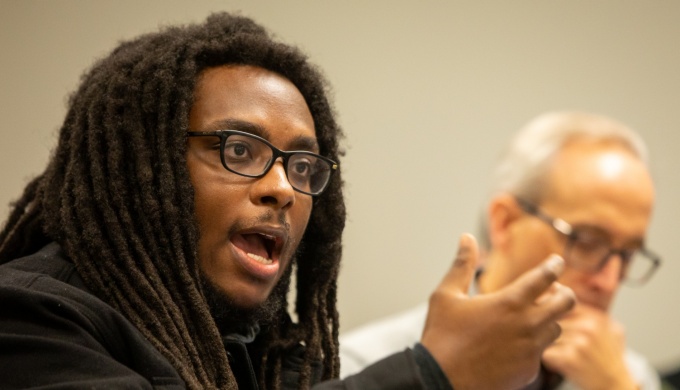MS in Social Sciences

The MS in Social Sciences Interdisciplinary Program offers students the freedom to design a specialized graduate curriculum, gain advanced training in research methods and complete a capstone research project.
Candidates combine research in a core social science concentration with related course work in a second social and behavioral science discipline, including Anthropology, Communication, Communicative Disorders and Sciences, Criminology, Economics, Geography, Linguistics, Political Science and/or Psychology.
The specific program of study for each student is determined in consultation with the Director and faculty adviser. Students are required to complete 33 credit hours of graduate level work consisting of:
- 15 credit hours in an area of concentration selected from Social Sciences department, including at least one graduate course in research methods or statistics.
- 15 credit hours in courses in a second area of Social Sciences. With prior approval up to six of these credit hours may be in an area of the Humanities, Natural Sciences or a Professional School.
- 3 credit hours of project guidance.
Generally, a maximum of six credit hours of course work offered in Humanities or Natural Sciences, or through the School of Engineering and Applied Sciences, the School of Public Health and Health Professions, and the School of Medicine and Biomedical Sciences may be applied to this program.
The final project – a research project and written report – offers students an opportunity to demonstrate how their primary discipline was enriched by multiple perspectives. The project should take an applied approach to developing a practical solution or solving a specific problem in your chosen fields in the social sciences. The research project must be written under the supervision of the student’s faculty advisor and approved by one other faculty member with expertise in the area of the candidate’s work.
Examples of final project topics include:
- Analyze the patterns and impacts of urban sprawl in a specific city. This project could involve using GIS to map land use changes over time, examining the environmental and social impacts, and proposing sustainable urban planning strategies.
- Study the cultural landscapes of a specific region and their significance. This project could involve documenting cultural sites, analyzing their historical and cultural importance, and proposing strategies for heritage preservation.
- Analyze how minorities are represented in media. This project might include content analysis of television shows, movies, or news articles, and examining the impact of these representations on public perceptions and attitudes.
- Study the relationship between social environment and youth crime rates. This project could involve collecting data on crime rates, conducting interviews with young offenders, and analyzing the influence of factors such as family, peers, and community.
- Conduct a sociolinguistic study on language variation within a specific community. This project could involve collecting and analyzing speech samples, examining factors that influence language variation, and exploring the social implications of these variations.
- Investigate how mindfulness practices affect student performance and well-being. This project could involve reviewing mindfulness programs in schools, collecting data on student outcomes, and analyzing the psychological and educational impacts.
- Investigate the role of a particular social movement in shaping public policy. This project might involve extensive archival research, analyzing primary sources, and examining the movement's impact on society.
- Develop a comprehensive waste management plan for a small city. This project might include analyzing current waste management practices, proposing improvements, and assessing the environmental and economic impacts.
For more information on how to create a Master’s degree that addresses your unique needs, please contact the graduate coordinator for IDP.
Graduate Interdisciplinary Degree Program
University at Buffalo
810 Clemens Hall
Buffalo, NY 14260
Phone: (716) 645-2711
Fax: (716) 645-6991
Program Coordinator
Jennifer Mdurvwa
716-645-1340
jmdurvwa@buffalo.edu